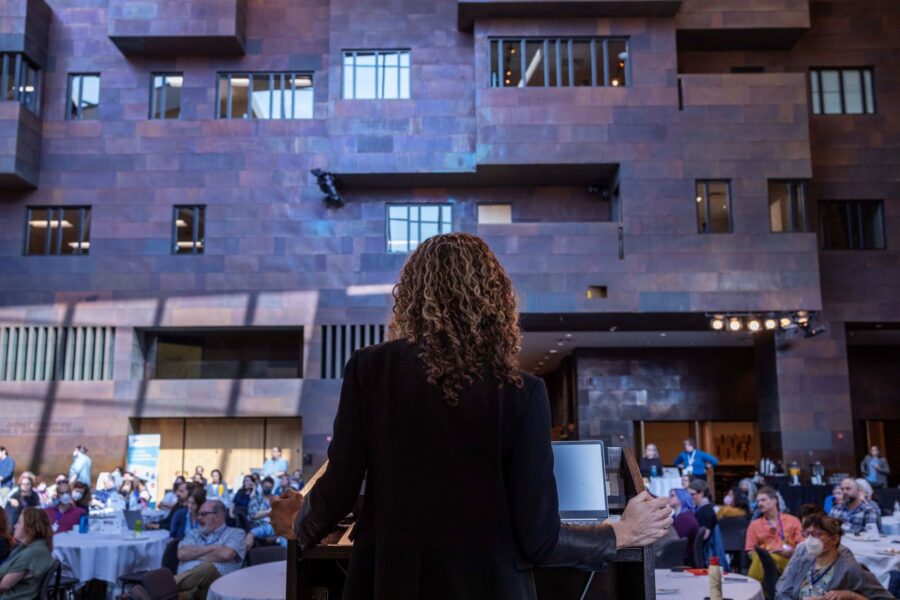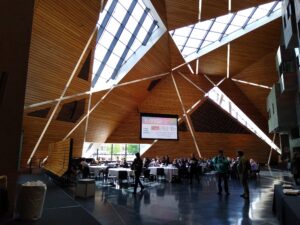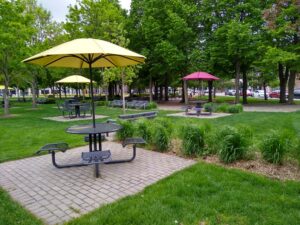
Multiple groups within LPC spent months developing a COVID policy for this year’s in-person Library Publishing Forum. Now that the event is behind us, I wanted to take a moment to reflect on how the policy was developed, how it worked in practice, and the feedback we received from the community. I hope that this blog post, in conjunction with the policy itself, will serve as a resource for other conference planners.
Policy recap
Our COVID policy was designed around three principles:
- As the organizers, we have a responsibility to provide the safest possible conference for our community. In the same way that we provide attendees with chairs to sit on and meals to eat, and speakers with microphones so that everyone can hear them, it is our job to provide attendees with a safe conference environment.
- Each attendee has a responsibility of care to the rest of the community. This principle is grounded in our community Code of Conduct, which lays out an expectation that community members will follow health guidelines.
- The policy needed to be flexible enough that attendees could determine which precautions were possible for them without having to disclose private medical information to conference staff and other attendees.
Once these principles were clear, the policy itself was fairly straightforward: we would provide masks, tests, supplemental air filtration, and boxed meals that could be taken outside; and attendees would manage their own COVID precautions (encouraged by copious and emphatic messaging before and during the conference). There is more detail in the full policy, including a list of precautions that we encouraged attendees to take, but the overall message was that everyone needs to do their part.
How the policy was developed
Creating the COVID policy was an iterative process that began in fall of 2023. I took the lead in developing it, but in classic LPC style, I did so by convening a number of group conversations and seeking feedback from multiple stakeholders. The discussion started with the Program Committee, which helped to sketch out an initial policy framework, and then expanded to include the Forum Scholarships Committee and the DEI Committee, both of which have a role in creating a welcoming environment at the Forum. Critical feedback from both groups – as well as a few community members who I knew had expertise in this area – led to significant revisions.
While that was happening, we were also working with the venue, the McNamara Alumni Center (possibly the most beautiful conference venue in all of academia, with top-notch staff) to gather the information we needed and figure out the logistics for the things we wanted to do. They agreed to let us provide Corsi-Rosenthal boxes for additional air filtration and were always quick to respond to our questions. They also asked nicely pointed questions when we told them we wanted to do something that was, in fact, not feasible.
Once the information was gathered and the policy was hammered out, it went to LPC’s Board for approval. The Board had a robust discussion about it, suggested a few changes, and drafted a short version that we could use on the conference home page (since they were initially daunted by the length of the full policy).
We had the policy finalized, approved, and posted by the time conference registration opened in February. The whole process took us about five months. It was challenging in that we didn’t have good models to work from, but easy in that our community already has a strong ethic of mutual support and care. We only had to hammer out how we were going to take care of each other, not whether we should.
What it looked like on the ground

So we had a policy we thought was workable, but it was still anyone’s guess how it would actually play out at the conference. We were hoping that everyone would take us up on the free tests and that most people would be masked most of the time. We were afraid that very few people would do either. In the end, reality was somewhere in the middle. We gave out about a quarter of the tests, and approximately a third of the people in any given session were masked. Obviously we were hoping for more, but compared to the rate of testing and masking in other settings (like the plane trip to Minneapolis), it felt like a significant accomplishment. There were enough people masking that anyone who needed or wanted to wear a mask wouldn’t feel isolated or hypervisible.

It’s possible many did not mask because of the layout of the event. When you’re eating meals and snacks in the same space where the sessions are happening, masking tends to feel more symbolic than effective. Attendees had the option to take their meals outside if they chose (and the weather cooperated), but they were coming back into a big, open space where 100 people had recently been eating and chatting, mask-free. It’s also hard to know how effective the Corsi-Rosenthal boxes were in the main space, which was cavernous (in a beautiful, welcoming sort of way). They felt more useful in the breakout rooms, which were much smaller and more enclosed.
By the middle of the second day of the two-day event, we still had a pile of masks and tests at the registration table and were starting to wonder what we would do with them. We announced to the attendees that anyone who wanted to take some extra COVID supplies was welcome to do so, and a handful of people gratefully scooped them up for later use. So our public health investment wasn’t wasted – it was just time-shifted a bit.
Budget and materials
The cost of our COVID prevention supplies was minimal in the context of a two-day event with an approximately $50k budget:
- Tests: $1,200 (iHealthⓇ COVID-19 Anitgen Rapid Test, 2 tests/kit)
- Masks: $70 (3M Aura Particulate Respirator N95; we also had some White PowecomⓇ KN95 Respirator Face Masks left over from a previous event)
- Corsi-Rosenthal boxes: $315

The Corsi-Rosenthal boxes could have presented a big problem, since they needed to be assembled locally and all of the staff were flying in for the event. We were lucky to have a local planning committee member who had made this type of filtration box before and who volunteered to pick up the supplies and put together the boxes. We used the Clean Air Crew instructions and created two boxes for the main space and one each for the two breakout rooms. If we had the same setup again, I would add another box for the quiet room, which was always in use by at least a few people and was repurposed during one break as the therapy animal room. (We worked with Boynton Health’s PAWS program to bring in a dog and a chicken to help attendees de-stress and gear up for the closing plenary session. It was delightful.)
Feedback
Feedback about the policy and implementation was almost universally positive. As soon as it was announced, we started receiving grateful emails about it. (And, if you’ve ever been responsible for developing and posting policy documents, you know how rare it is to get positive feedback about them.) Attendees told us how much they appreciated it, both face to face and on the conference feedback form. Most of the feedback boiled down to either “I feel safe at this conference” or “Thank you for taking this seriously.” One category of feedback we really didn’t expect was from other conference planners. We didn’t think we were doing anything all that special, but we have heard from multiple groups that they plan to use our policy as a model in the future.
The only negative feedback we received was from one person who felt it was a *bit much* to mention the COVID policy in the room host remarks before every session. We probably could have varied the script a bit, but there are only so many planning hours in the day. I expect we would have received more pushback if we had made any of the precautions mandatory – people tend to be pretty chill about policies they can ignore without consequences.
We haven’t heard from any attendees that they caught COVID at the event, but a) we didn’t ask them to notify us, and b) many attendees traveled significant distances to attend and probably had exposures in multiple settings, so determining whether someone contracted COVID at the Forum is likely impossible. Still, it’s encouraging that it doesn’t seem to have been a superspreader.
Plans for the future
Since it is unlikely that COVID will become less of a public health threat before our next in-person conference (spring of 2026), we will likely use this policy again. We will need to make adjustments for the venue (TBD), and we will obviously adapt it to reflect the realities of public health at that moment in time. If we are interested in strengthening it, the easiest choice would be to require a negative COVID test to pick up registration materials on day one. We didn’t do that this year, because we didn’t want to create a situation where an attendee’s institution wouldn’t reimburse them for travel if they sat out the event because of an asymptomatic COVID case. Before making a negative test a requirement, we would want to a) check the current research on rapid test effectiveness, and b) ask the community if they anticipate any problems with such a policy. We didn’t have time to do that outreach this year, so we decided in favor of flexibility.